In today’s digital age, a well-structured digital marketing strategy framework is the key to thriving in the online landscape. As businesses navigate the complexities of the digital world, a clear roadmap can make all the difference. This comprehensive guide will walk you through the essential components of a digital marketing strategy and how to develop a framework that ensures your brand’s success.
Key Components of an Effective Digital Marketing Strategy
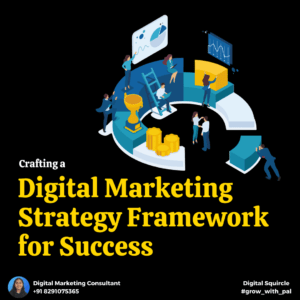
An effective digital marketing strategy framework is built upon several essential components, each serving a unique role in achieving your goals. These components include:
- Setting Clear Goals and Objectives
- Understanding Your Target Audience
- Content Marketing and social media Strategy
- Email Marketing Strategy
- Search Engine Optimization (SEO) Strategy
- Paid Advertising Strategy
- Measuring and Analyzing Your Strategy
- Adapting and Evolving Your Strategy
- Common Mistakes to Avoid in Digital Marketing Strategy
Tips for Developing a Budget-Friendly Digital Marketing Strategy
1. Setting Clear Goals and Objectives
The cornerstone of any effective digital marketing strategy framework is setting clear goals and objectives. To ensure your strategy’s success, make your goals SMART – Specific, Measurable, Achievable, Relevant, and Time-bound. Consider these crucial aspects:
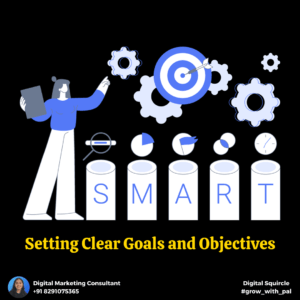
- Specific: Your goals should be well-defined. For instance, instead of a vague goal like “increase sales,” aim for “achieve a 20% increase in monthly sales through digital marketing efforts.”
- Measurable: Define metrics to track your progress. Use key performance indicators (KPIs) like website traffic, conversion rates, or revenue to quantify your success.
- Achievable: Set realistic goals that align with your resources and capabilities. Aim for growth, but make sure it’s attainable.
- Relevant: Your goals should relate to your overall business objectives. They should contribute to your business’s growth and success.
- Time-bound: Assign a timeframe to each goal. For instance, “increase website traffic by 30% in the next six months.”
Having SMART goals ensures that your team is focused and working toward specific, measurable achievements, making your strategy more effective.
2. Understanding Your Target Audience
Understanding your target audience is the foundation of a successful digital marketing strategy. Comprehensive research helps you create content and campaigns that resonate with your potential customers. Key steps include:

- Demographic Analysis: Explore the age, gender, location, and other demographics of your target audience. This information influences the type of content and platforms you should use.
- Behavioral Insights: Understand your audience’s online behaviors. What websites do they visit? What are their social media preferences? This information guides your ad placements and content choices.
- Persona Development: Create detailed customer personas. These fictional representations of your ideal customers help you tailor your marketing efforts effectively.
- Pain Points and Needs: Identify the challenges and needs of your target audience. Your content and campaigns should offer solutions or address these pain points.
Understanding your audience empowers you to create content that engages, converts, and builds brand loyalty.
3. Content Marketing & Social Media Strategy
A robust content marketing and social media strategy is the heart of your digital marketing framework. Your approach should be tailored to your audience and the platforms they frequent. Key aspects include:

- Content Creation: Develop content that educates, entertains, or informs your audience. High-quality blog posts, videos, infographics, and other formats can engage your audience.
- Consistency: Maintain a consistent posting schedule to keep your audience engaged and returning for more.
- Social Media Platforms: Focus your social media efforts on platforms relevant to your target audience. For instance, Instagram is ideal for visually appealing content, while LinkedIn caters to professionals.
- Content Calendar: Organize your content with a posting schedule and content calendar to ensure consistency and variety.
- Engagement: Respond to comments and engage with your audience on social media. Build a sense of community and trust.
A strong content marketing and social media strategy enhances your online presence, attracts more visitors, and fosters brand loyalty.
4. Email Marketing Strategy
Email marketing remains a powerful tool in the digital marketing arsenal. Here’s how to build a successful email marketing strategy:
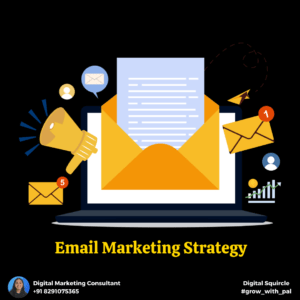
- Segmentation: Divide your email list into segments based on user behavior, demographics, and engagement. Send targeted emails to each segment.
- Engaging Content: Create compelling and relevant email content. Inform, entertain, or offer exclusive deals to encourage open rates and click-throughs.
- Automation: Use email marketing platforms to set up automation for welcome emails, drip campaigns, and personalized recommendations.
- Optimization: Regularly analyze email performance and tweak your strategy. Optimize subject lines, content, and send times for better results.
5. Search Engine Optimization (SEO) Strategy
Your digital marketing strategy framework must include a comprehensive SEO strategy to improve your website’s visibility in search engine results. Key elements include:

- Keyword Research: Identify relevant keywords your target audience uses. Focus on long-tail keywords that reflect user search intent.
- On-Page SEO: Optimize your website’s on-page elements, including meta tags, headings, and content, to align with targeted keywords.
- Quality Content: Regularly publish high-quality content that provides value to your audience. Content that addresses user needs and interests can attract organic traffic.
- Link Building: Earn high-quality backlinks to your website. They act as signals of trust and authority, boosting your search engine ranking.
- Technical SEO: Ensure your website has a solid technical foundation, including fast loading times, mobile-friendliness, and a secure HTTPS connection.
Effective SEO increases your online visibility, drives organic traffic, and can enhance your brand’s credibility.
6. Paid Advertising Strategy
Incorporate a well-defined paid advertising strategy into your digital marketing framework for faster results. Consider these aspects:
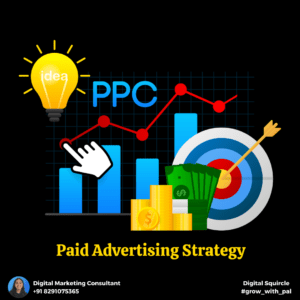
- Platform Selection: Choose the right advertising platforms based on your audience and business goals. Common platforms include Google Ads, Facebook Ads, and LinkedIn Ads.
- Budget Allocation: Distribute your advertising budget effectively among platforms, campaigns, and ad groups.
- Ad Copy and Creatives: Craft compelling ad copy and visuals to capture the audience’s attention and convey your message effectively.
- Audience Targeting: Use precise targeting options to reach potential customers who are more likely to convert.
- Regular Monitoring: Continuously monitor and adjust your ad campaigns for optimal performance.
Paid advertising can provide a significant boost to your digital marketing efforts by driving immediate traffic and conversions.
7. Measuring and Analyzing Your Strategy
Measurement and analysis are vital components of your digital marketing strategy framework. Utilize these best practices:
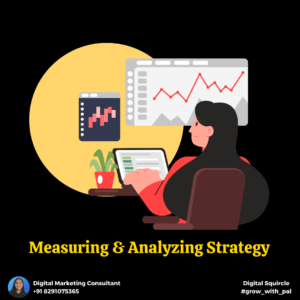
- Tools and Analytics: Employ digital marketing analytics tools like Google Analytics and social media insights to track your campaign performance.
- KPI Tracking: Set key performance indicators (KPIs) to monitor your progress effectively. Common KPIs include website traffic, conversion rates, click-through rates, and ROI.
- Regular Reporting: Create comprehensive reports that highlight successes and areas for improvement. Share these reports with your team and stakeholders.
- Adjustments: Use the insights gained from analytics to make data-driven adjustments to your digital marketing strategy. Regular optimization is essential for long-term success.
8. Adapting and Evolving Your Strategy
A critical aspect of your digital marketing strategy framework is the ability to adapt and evolve. The digital landscape is ever-changing, and what works today may not work tomorrow. Here’s how to ensure your strategy remains effective:

- Continuous Learning: Stay updated on the latest digital marketing trends, algorithm changes, and emerging technologies. Subscribe to reputable industry blogs, attend webinars, and consider professional certifications.
- Regular Audits: Conduct regular audits of your digital marketing efforts. Evaluate what’s working, what isn’t, and where improvements can be made.
- Competitor Analysis: Keep an eye on your competitors. Analyze their strategies and identify gaps you can fill or areas where you can excel.
- Feedback Loop: Solicit feedback from your team and customers. They may offer valuable insights into what’s working and what needs adjustment.
- Scalability: Ensure your strategy can scale as your business grows. Be prepared to allocate more resources, expand to new platforms, and reach larger audiences.
9. Common Mistakes to Avoid in Digital Marketing Strategy
Your digital marketing strategy framework should also include awareness of common pitfalls that can hinder success. Be mindful of these mistakes:
- Neglecting Mobile Users: Failing to optimize your content and website for mobile users can result in a significant loss of traffic and conversions.
- Ignoring SEO: Neglecting search engine optimization can limit your online visibility and organic traffic.
- Inconsistent Branding: Inconsistent branding across different channels can confuse your audience. Maintain a cohesive brand identity.
- Ignoring Analytics: Failing to track and analyze data can lead to ineffective campaigns and missed opportunities for improvement.
- Overlooking Social Media Engagement: Engage with your audience on social media, respond to comments, and encourage conversations. Neglecting this aspect can result in a loss of trust and followers.
10. Tips for Developing a Budget-Friendly Digital Marketing Strategy
Not every business has an endless marketing budget. These tips can help you develop a cost-effective digital marketing strategy:
- Focus on Free and Low-Cost Tools: Many digital marketing tools offer free or low-cost plans. Utilize them for email marketing, social media scheduling, and analytics.
- Content Repurposing: Maximize the use of your content by repurposing it in various formats, such as blog posts, videos, infographics, and podcasts.
- Community Engagement: Foster a community of brand advocates and loyal customers. Word-of-mouth marketing can be highly cost-effective.
- DIY Skills: Learn essential digital marketing skills to reduce the need for outsourcing. You can handle tasks like content creation, social media management, and basic SEO.
- Outsource Strategically: When outsourcing is necessary, choose cost-effective digital marketing freelancers or agencies that align with your budget.
By following these recommendations, you can create a digital marketing strategy framework that is adaptable, avoids common pitfalls, and achieves cost-effective results.
Conclusion for Our Digital Marketing Strategy Framework
In conclusion, a well-structured digital marketing strategy framework is the compass that guides your business through the vast and ever-changing digital landscape. From setting clear objectives to understanding your target audience, implementing effective content and social media strategies, and optimizing your website for search engines, every component plays a crucial role.
Furthermore, email marketing and paid advertising strategies help you reach your audience more effectively, while measuring and analyzing your efforts ensures you can adapt to changes and improvements. Avoiding common mistakes and developing a budget-friendly strategy are essential aspects to consider.
A robust digital marketing strategy framework not only brings clarity to your efforts but also enables you to harness the full potential of digital marketing, leading to increased brand visibility, customer engagement, and business growth.
Ready to Begin Your Digital Marketing Journey?
If you’re ready to embark on a successful digital marketing journey with a well-crafted strategy framework, we’re here to help. Our team of experts specializes in creating digital marketing solutions tailored to your unique business needs.
Feel free to reach out to us today, and let’s explore how a comprehensive digital marketing strategy framework can take your business to new heights in the digital realm.
Thank you for taking the time to delve into the world of digital marketing strategy. Stay tuned for more insights and tips from our experts.
